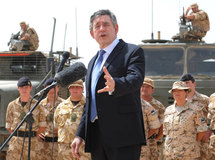PM insists enough British troops in Afghanistan
Katherine Haddon
LONDON, Katherine Haddon - British Prime Minister Gordon Brown fended off calls Monday to send more troops and equipment to Afghanistan after the blackest day yet for forces there, with eight soldiers killed in 24 hours.
Although public support for the eight-year British operation remains high, opposition politicians and commentators are increasingly questioning the terms and conditions under which the forces have to fight.

"All of the military requirements will be met," he said.
"It has been a very difficult summer and it's not over yet but if we are to deny Helmand to the Taliban in the long run... then we must persist with our operations in Afghanistan".
The main opposition Conservatives charge that Britain has a shortage of helicopters, meaning troops often have to travel by road and are vulnerable to deadly improvised explosive devices increasingly favoured by the Taliban.
"If we cannot move our forces by air, they are more vulnerable on the ground," Conservative defence spokesman Liam Fox said, adding that the US had eight times the number of helicopters for the number of personnel.
Other military and political figures also claim Britain lacks a clear strategy in Afghanistan.
Brown said Monday the aim was to prevent extremist plots in Britain, of which 75 percent have links to Afghanistan, while new Defence Secretary Bob Ainsworth cited a wish to help Afghans defend themselves from the Taliban.
Paddy Ashdown, the international community's former representative to Bosnia, told the BBC that Britain and other countries had set "ludicrously over-ambitious targets and set ourselves up for failure" in Afghanistan.
Critics also say Ainsworth lacks the political clout to fight the forces' corner in government. He was recently ranked 21st in a ministerial power list -- the lowest ever for a defence secretary.
The government has also been attacked for not sending enough troops as it also contends with a deployment in Iraq which has only recently started winding down.
The former chief of the defence staff, Charles Guthrie, last week accused the Treasury of having spent "the minimum they could get away with" on defence, although Brown says there had been a huge funding increase.
About 100 protesters waved banners and chanted slogans outside Downing Street late Monday in a rally hastily organised by the Stop The War Coalition.
Police refused to let several protesters deliver a letter to the prime minister calling for troops to be pulled out of Afghanistan.
Britain currently has around 9,000 troops in Afghanistan in the run-up to August's elections, up from 8,300 prior to the build-up. Brown said force levels were "under constant review".
Some 15 British troops have died this month out of a total of 184 fatalities since 2001.
Despite the number of deaths, public backing for British involvement in the Afghan conflict has grown, according to a poll for the Guardian and the BBC's Newsnight programme.
Opposition to the war at 47 percent is just ahead of support at 46 percent, said the ICM poll of 1,000 people conducted as news broke of the new deaths.
Backing for Britain's role in Afghanistan has grown since 2006, the last time an ICM poll was conducted on the subject, up 15 points from 31 percent, the Guardian newspaper said.
Opposition has fallen over the same period by six points, from 53 percent.
British troops are engaged in heavy fighting as part of Operation Panther's Claw, aimed at improving security ahead of next month's Afghan elections.
The United States has said it is sending up to 30,000 new troops to Afghanistan this year as the Taliban -- ousted from power by the US-led invasion in 2001 -- has regrouped.
----------------------------------------------------------------------------------------------------------------------